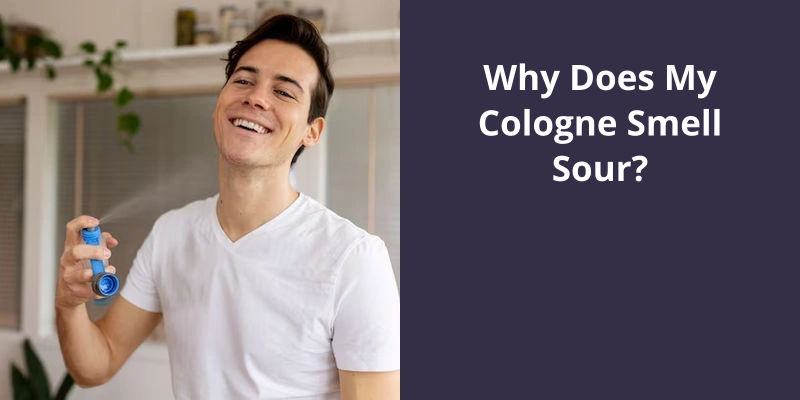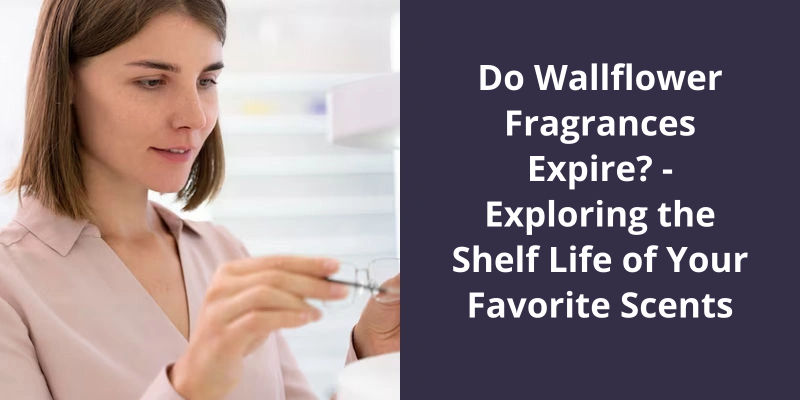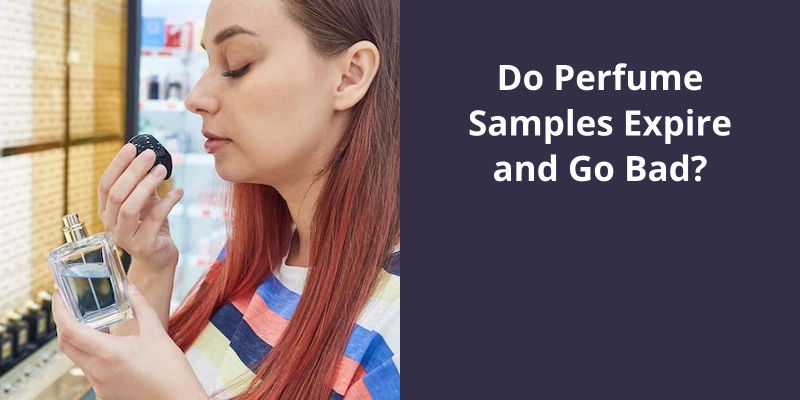Your cologne might smell sour due to a number of reasons. If the fragrance has not been stored properly, which means in a cool, dry place without direct exposure to sunlight or intense heat, the ingredients can degrade and cause a sour smell. It’s also possible that it has simply expired. Most perfumes have a shelf-life of 3-5 years. If you’ve owned yours longer, it might have gone bad. Lastly, your personal body chemistry can also affect how a cologne smells on you. Factors like skin type, diet or even medication can alter a fragrance. Thus, your cologne might interact differently with your skin, causing it to smell sour.

Why Does My Cologne Smell Weird?
Furthermore, improper storage can also lead to unpleasant smells in your cologne. If youre leaving your cologne in a damp bathroom or on a windowsill, then it will most likely absorb the ambient smells of the environment. So, make sure that youre storing it in a cool, dry place away from sunlight and moisture.
Another cause behind your cologne smelling weird could be the essential oils used to create the scent. Some natural oils are more volatile than others, and they can degrade much faster. If your cologne contains a high concentration of these oils, then it may start to smell strange after a while.
On the other hand, synthetic fragrances tend to be more stable and last longer, but they can also cause problems. Some synthetic fragrances have a higher risk of causing skin irritation or allergies, and they can also be more likely to cause headaches.
Not all colognes are created equal, and some will naturally last longer and smell better than others. If youve been using the same bottle for a long time, then it may be time to try a new brand.
Finally, it’s important to remember that your nose can also develop a tolerance to certain smells over time. So, even if your cologne hasnt changed, it may just be that youve become desensitized to the scent. In this case, try switching up your fragrances every now and then to keep things fresh.
Differences Between Colognes, Perfumes, and Eau De Toilettes
- Colognes have a lower concentration of fragrance oils and typically last for up to two hours.
- Perfumes have a higher concentration of fragrance oils and can last for up to six hours or more.
- Eau de toilettes have a lower concentration of fragrance oils than perfumes but more than colognes and usually last for up to three hours.
- Colognes are generally lighter and fresher, making them ideal for everyday use.
- Perfumes are more potent and often associated with special occasions or evenings out.
- Eau de toilettes are versatile and can be used for both casual and formal occasions.
- The price of a fragrance often corresponds to the concentration of fragrance oils, with perfumes being the most expensive and colognes the least.
It’s important to pay attention to the scent of your cologne or perfume. If it smells like vinegar or has undergone a drastic change in concentration, it’s possible that it’s expired. This can happen over time, especially if the perfume hasn’t been stored correctly or used regularly. Additionally, certain fragrance notes can break down and create an unpleasant odor, leading to a vinegar-like smell. To avoid this, it’s best to store your fragrance in a cool, dry place and use it within it’s recommended timeframe.
Why Does My Cologne Smell Like Vinegar?
Expired fragrances can happen for several different reasons. One reason is if the bottle has been exposed to sunlight or heat for an extended period of time. This can cause the perfume or cologne to break down and lose it’s potency. Additionally, if the bottle has been open for a prolonged period of time, the fragrance can evaporate and become less concentrated, making it smell different from when it was first opened.
Another reason for a vinegar-like smell in your perfume or cologne could be due to the chemical composition of the scent. Some fragrances contain ingredients that can react with the natural oils on your skin, creating an acidic or vinegar-like smell. This can also be exacerbated if you’ve particularly acidic skin or if you’ve been sweating excessively.
It’s important to note that colognes and perfumes do have a shelf life. Fragrances typically last for 3-5 years from the date they were manufactured. After this time, the scent can start to degrade and lose it’s original character. If your cologne smells like vinegar and has exceeded it’s expiration date, it’s best to throw it out and purchase a new bottle.
To avoid your fragrances from expiring too quickly, it’s important to store them properly. Keep your perfume and cologne away from direct sunlight, heat, and moisture. This means storing them in a cool, dry place, away from windows or bathrooms where they can be exposed to steam.
Over time, fragrances can break down and lose their potency, causing them to smell differently from their original scent. To prevent this from happening, make sure to store your fragrances properly and replace them every few years to ensure that you’re always smelling your best.
How to Properly Apply Cologne or Perfume to Ensure It Lasts Longer.
- Apply cologne or perfume after showering or bathing.
- Hold the bottle 3-6 inches away from your skin.
- Spray on pulse points such as wrists, neck, and chest.
- Don’t rub in the fragrance, let it dry on it’s own.
- Layer fragrance by using matching body wash, lotion, and deodorant.
- Avoid applying too much fragrance, a little goes a long way.
- Reapply as needed throughout the day.
Air conditioning is a convenient luxury that we take for granted in our daily lives. However, sometimes problems arise, particularly when we notice unpleasant odors, such as the scent of vinegar. This can be a sign of hazardous gases being emitted from the air conditioning system, which need to be addressed immediately in order to maintain the safety and comfort of our homes.
What Gases Smell Like Vinegar?
Ozone is a gas that’s a pungent and distinct odor. It’s primarily created by electrical discharges, such as lightning, ozone generators, and electric motors. When ozone is released into the air, it can react with other chemicals and create a sour vinegary smell.
Other gases, such as acetic acid, can also produce a vinegary aroma. Acetic acid is a weak acid found in vinegar, and it’s commonly used in the production of plastics, paints, and textiles. When acetic acid is released into the air, it can create a sour smell, much like vinegar.
Both of these gases are produced by natural and man-made sources and are commonly associated with the smell of rotten eggs. However, at low concentrations, they can also create a sour or vinegary aroma.
It’s important to note that the presence of a vinegar-like smell in the air may indicate an issue with indoor air quality. If you’re experiencing a sour or unpleasant smell, it’s recommended to investigate the source and address it promptly. Common causes of indoor air quality issues include inadequate ventilation, mold growth, and the use of chemical cleaners or pesticides.
It’s important to know when your Cologne has gone bad and what to look out for. Our sense of smell is incredibly nuanced, and even slight changes in the formula of your favorite scent can make a world of difference. Unwanted or chemical notes can start to develop as it ages, indicating that it’s time to replace it. But what exactly happens to your Cologne over time? Let’s find out.
Does Cologne Smell Different After a While?
Other factors can also affect the way a scent smells over time. Exposure to heat and sunlight can accelerate the breakdown of fragrances and alter their aroma. Similarly, storing fragrances in areas with high humidity levels can cause moisture to affect the scent.
Overuse of a particular scent can lead to olfactory fatigue, where the scent becomes less noticeable to the wearer over time. Conversely, underuse of a scent can cause the aromatic components to break down and lose their original scent profile.
Some scents are designed to change over time, while others are intended to maintain their original scent profile throughout their lifespan. Fragrances with top, middle, and base scent notes are designed to evolve over time, with the top notes fading after the scent is first applied and the middle and base notes becoming more prominent over time. However, even these scents will eventually deteriorate over time.
If you notice that your scent smells vastly different from when you bought it or if it develops hints of vinegar or other chemical notes, it may be going off. To ensure the longevity of your fragrances, store them in a cool, dark place away from sunlight and moisture.
In addition to the factors mentioned above that can impact the way we perceive scent, it’s also important to note that perfumes themselves can change over time. As fragrances age, they can break down and evolve in unexpected ways, causing them to smell slightly different than when they were first purchased. With these complexities in mind, it’s always a good idea to pay attention to how your perfume smells, especially if you’ve noticed any sudden shifts in it’s scent profile.
Why Does My Perfume Suddenly Smell Different?
Have you ever noticed that your favorite perfume suddenly smells different? You may be wondering why this is happening, as you havent changed your perfume in any way. Interestingly, there are several factors that can cause a perfume to smell different to your nose. Perhaps the most common reason is a change in temperature or humidity due to travel or seasonal changes. When temperatures and humidity levels rise, your perfume may smell stronger and more intense.
Certain foods can alter your bodys chemistry, which in turn can affect how well your perfume interacts with your skin. Spicy foods, for example, can make a perfume smell stronger, while acidic foods can make a perfume smell sour. Lack of sleep can also have an impact on your perfume. When youre tired, your sense of smell is less acute, which means that a perfume that normally smells great may become too strong or overpowering.
Your work environment can also play a role in how your perfume smells. If you work in a high-stress environment, your body may produce more sweat, which can cause your perfume to smell differently. Age is yet another factor that can affect how you perceive perfumes.
It’s worth noting that perfumes can last for an average of five years. After that, they begin to lose their potency and may not smell as good as they used to. If you’ve an old perfume that suddenly smells different, it could be due to it’s age. This is particularly true if youve had the perfume for several years and havent used it for a while. If youre feeling down or stressed, a perfume that normally smells great may suddenly become unpleasant to your nose.
Changes in pressure/elevation, temperature, humidity, diet, work environment, age, and the bodys pH level are all factors that can change how we perceive perfumes. It’s important to remember that perfumes can also lose their potency over time and may require replacement as they age.
The Science Behind Perfume Chemistry and How It Affects It’s Scent.
Perfume chemistry involves studying the chemical compounds and interactions that create each scent. The unique combinations of ingredients can alter the fragrance’s aroma and how it evolves over time on the skin.
So, if you’ve noticed that your favorite perfume smells different on you now than it did when you first started wearing it, you’re not imagining things. The way fragrances interact with our skin chemistry can change over time, and aging also plays a role in how we perceive scents. But what exactly happens to perfume as we age, and how can we choose the right fragrance for our changing senses? Read on to find out.
Does Perfume Smell Different on You as You Age?
As you age, your skin changes, and so does the way perfume interacts with it. Younger skin has a higher water content, which enhances the top notes of a perfume and makes it appear lighter and fresher. On older skin, which tends to be drier, the fragrance may appear duller and less vibrant. This is why it’s important to choose perfumes that suit your skin type and the mood you want to create.
Another factor that affects the way perfume smells on you is your hormone levels. Women who’re pregnant or going through menopause may find that their usual perfume smells different or even unpleasant due to changes in their body chemistry. Similarly, stress, medications, and diet can all alter the natural balance of your skin, affecting the way perfume reacts with it.
It’s also worth noting that the way you wear perfume can influence how it smells on you. Applying perfume to your hair or clothing rather than directly on your skin can change the way it evolves over time, as can layering different fragrances together. Some people even find that their natural body odor can complement or clash with certain perfumes, affecting the overall scent experience.
Ultimately, the best way to determine how perfume smells on you as you age is to experiment with different fragrances and application techniques. Take your time to find scents that work with your body chemistry and personal style, and don’t be afraid to try something new. After all, smelling great is a timeless pleasure that can bring joy and confidence at any age.
The Differences in Perfume Formulations for Different Skin Types and How to Choose the Best Perfume for Your Skin.
- Perfume formulations for oily skin
- Perfume formulations for dry skin
- Perfume formulations for combination skin
- Tips for choosing the best perfume for your skin type
Conclusion
Overall, understanding why your cologne smells sour can lead to better fragrance maintenance habits. Keeping your perfume stored in a cool and dark place, away from sunlight and extreme temperatures, can help preserve it’s scent for longer. Additionally, being mindful of expiration dates and testing the fragrance before purchasing can help avoid disappointment and frustration. Adhering to these guidelines can ensure that your fragrance stays fresh, enticing, and enjoyable for as long as possible.





